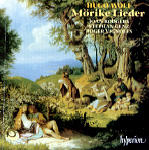Is half a Wolf Mörike-Lieder recital better than none? Before considering this two-disc program containing all 53 of Hugo Wolf’s settings of poems by Eduard Mörike, I suggest you spend a few minutes listening to Arleen Auger’s renditions of 13 of these same songs (also on Hyperion), accompanied by pianist Irwin Gage. By now you’ve guessed that the troubling half of the current set (26 of the 53 songs) is the one sung by soprano Joan Rodgers, and when you hear her forced, technically limited (way too many breaths, strained upper register), interpretively bankrupt (unsubtle, overly theatrical) efforts (and I do mean efforts) next to Auger’s consummate artistry and absolutely convincing interpretations, you’ll know why my reservations about this release are so strong.
Wolf’s creations, the products of a rushing flood of energy during one remarkable year (1888), demand a singer of commanding versatility and wide interpretive range–and Rodgers just doesn’t have either of these things. Can she sing quietly, with a hint of anticipation or longing, or, heaven forbid, sensuality? Not on evidence of these performances. Hear, if you dare, how she rushes through the gorgeous Verborgenheit, a song that requires the greatest restraint and most careful attention to intonation and enharmonic changes that create marvelous color effects while illuminating the text’s themes of resignation and solitude. Instead, Rodgers rips through what should be deliciously tension-filled lines and ruins the climax with a screechy, uncontrolled utterance, the ending just a routine close with not the slightest hint of the song’s meaning. Rodgers’ behind-the-beat, in-like-a-lion rendition of Er ist’s (Spring is here) appears crude next to Auger’s more appropriate, textually and musically sensible interpretation that builds gradually from the delicate “blue ribbon fluttering through the breezes” to the final exclamation, “Spring, yes, it is you! I have heard you!” Rodgers’ vibrato gets more obtrusive and unmannerly the louder and higher she sings. Further, her tone quality changes widely from register to register.
There would be little point in going on–except that baritone Stephan Genz is well worth hearing, and his presence on this recording is the reason any Wolf fan–or lieder aficionado–should care about it. He proves a kind of young Fischer-Dieskau in interpretive style if not exactly in vocal character (he doesn’t have quite the same velvety tone or liquid legato), and he injects each of his songs with believable understanding of the poetry and of Wolf’s musical expression of it. Pianist Roger Vignoles seems to rise (or succumb) to each singer’s level of artistic mastery. In Genz’s case, he’s more complementary, more supportive; with Rodgers, his role is far more extroverted and forceful, even becoming hard-edged at times as if to meet the singer’s own timbre and expressive manner. I suggest ignoring the temptation to have the complete Mörike-Lieder in one box. Although you’ll miss some of the songs, more musically and vocally satisfying choices lie with separate recordings of Wolf songs by Auger (Hyperion) and Fischer-Dieskau (DG), each of which features selections from Wolf’s Mörike and Goethe settings.
































